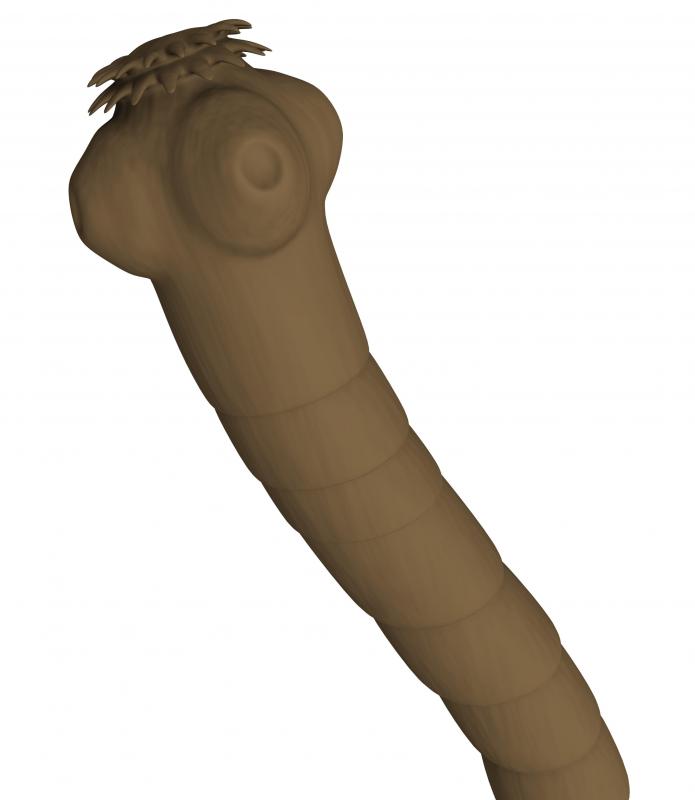At AllThingsNature, we're committed to delivering accurate, trustworthy information. Our expert-authored content is rigorously fact-checked and sourced from credible authorities. Discover how we uphold the highest standards in providing you with reliable knowledge.
What are the Symptoms of Parasites in Cats?
Symptoms of parasites in cats are wide-ranging, depending on the type of parasites involved. External parasites cause the cat to itch, which leads to scratching and sometimes chewing on the areas of skin that are affected. Hair loss and dry skin can also result from external parasites. Internal parasites can cause appetite loss, diarrhea and vomiting. Anemia can result from both internal and external parasites.
External cat parasites include fleas and ticks. When a cat has fleas, dark specks can usually be spotted in the cat's fur and around the area where it sleeps. An affected cat will often scratch and chew around the base of its tail, where fleas congregate. Ticks obtain nutrition from cats' blood and transmit various diseases. Rocky Mountain Spotted Fever causes intestinal upset, and Lyme Disease can result in arthritis.

Parasites in cats can cause allergies. When infested with fleas, some cats suffer allergic reactions to the fleas' saliva. These reactions, called flea allergy dermatitis, result in hair loss, dry skin and raised lesions that are red in color. Sometimes the cat might pull out its own fur. Symptoms of flea allergy dermatitis grow worse in summer and fall, when fleas are more prevalent.

Ear mites, one of the most common feline parasites, cause itching and will often make a cat shake its head back and forth. Infection can result from ear mite infestation, since the mites get their food from the fluid in a cat's ear. If ear mites are left untreated, the complications of bacterial infection could make a cat go deaf.
Tapeworms, an internal parasite in cats, are passed to felines when they ingest fleas that have eaten tapeworm larvae. Symptoms of tapeworm infection include itching around the cat's anus and the presence of tapeworm segments around the anus or in the cat's feces. If a cat has a great many tapeworms, it can suffer weight loss and malnutrition.

Hookworms and roundworms are two internal parasites in cats that can cause damage to a cat's health if left untreated. Hookworms usually feed on the small intestinal lining, but sometimes they feed on blood. Symptoms include blood in a cat's feces, weight loss and anemia. Roundworms, a common intestinal parasite in cats, can cause diarrhea and vomiting and are particularly dangerous for kittens and sickly mature cats.
Outdoor cats are prone to parasites such as lungworms and flukes. The main symptom of lungworm infection is coughing. Flukes can cause loss of appetite and swelling of the cat's abdomen.

Getting rid of parasites in cats is best accomplished by a visit to a veterinarian. Many effective medications are available that will eradicate parasites. The best methods of preventing parasites are ensuring that the cat receives regular veterinary care and either keeping it indoors or not allowing it to roam outdoors unsupervised.
Frequently Asked Questions
What are the most common signs that my cat may have parasites?

Common signs of parasites in cats include weight loss, changes in appetite, a dull coat, vomiting, diarrhea, and the presence of worms in feces or around the anus. Cats may also scoot their bottoms on the ground if they have tapeworms, and you might notice lethargy or a pot-bellied appearance, especially in kittens.
Can indoor cats get parasites, and how would they contract them?
Yes, indoor cats can get parasites. They may contract them through ingesting infected fleas while grooming, consuming contaminated food or water, or from exposure to infected feces. Even indoor environments can harbor parasites, as eggs or larvae can be brought in on shoes or other pets.
How can I tell if my cat has worms?
If your cat has worms, you may notice visible segments or whole worms in their feces, near their anus, or in their bedding. Symptoms like vomiting, diarrhea, a swollen abdomen, weight loss, or a change in appetite can also indicate a worm infestation. Regular veterinary check-ups can help detect worms before they become a serious issue.
Are there any long-term effects of parasites on my cat's health?
Parasites can cause long-term effects on a cat's health if left untreated. Chronic infestations can lead to malnutrition, anemia, and intestinal blockages. Severe cases, particularly in kittens or immunocompromised cats, can even be fatal. Prompt treatment and preventive measures are crucial to avoid long-term health issues.
What should I do if I suspect my cat has parasites?
If you suspect your cat has parasites, schedule a visit with your veterinarian. They can perform a fecal examination to diagnose the type of parasite and prescribe the appropriate treatment. It's important to follow the treatment plan fully and practice good hygiene to prevent reinfestation and protect other pets and family members.
Can parasites in cats be transmitted to humans, and how can I prevent this?
Some parasites in cats, like roundworms and hookworms, can be transmitted to humans, particularly to children or immunocompromised individuals. To prevent transmission, practice good hygiene, such as washing hands after handling litter or feces, keep your cat's living area clean, and ensure regular deworming and veterinary check-ups for your cat.
AS FEATURED ON:
AS FEATURED ON:















Discuss this Article
Post your comments